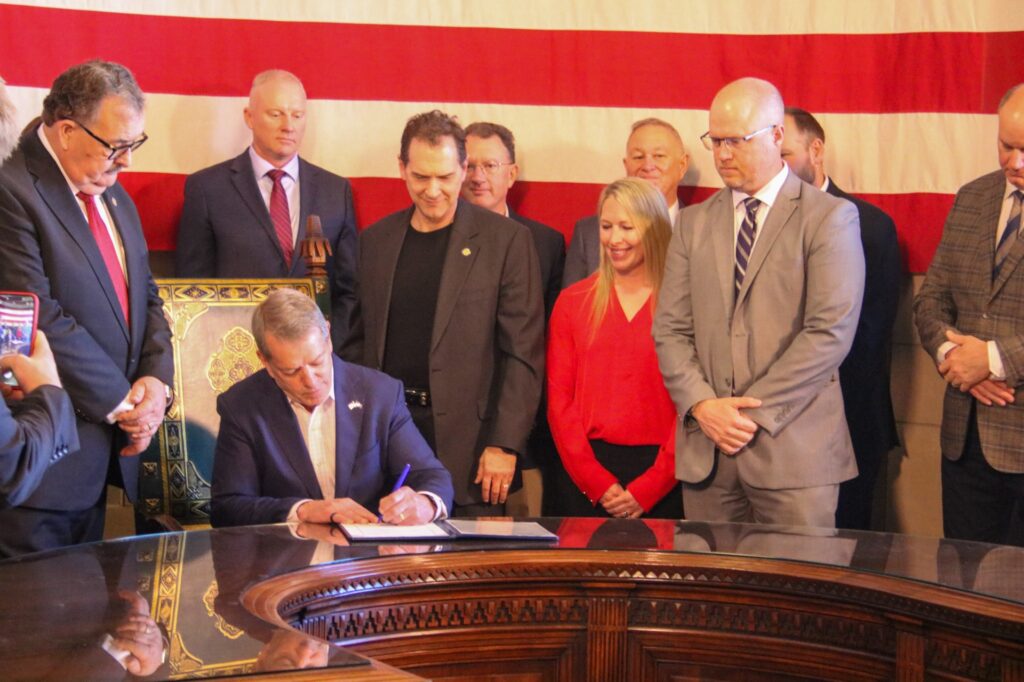

By Ted Slafsky
On April 9th, Nebraska Gov. Jim Pillen (R) signed a comprehensive 340B contract pharmacy access law that went into effect immediately. The governor embraced the bill, which had broad bipartisan support and easily passed the unicameral legislature, and gave a moving tribute to hospitals during a signing ceremony attended by several state lawmakers and hospital executives. Pillen got emotional talking about the great care he received at two hospitals—a small rural hospital and the University of Nebraska Medical Center, to which he was transported by air after a serious accident in December. State lawmakers and hospital leaders gave powerful remarks about how important 340B is to the local economy, rural health, and independent pharmacies during the 21-minute signing ceremony.
Nebraska is not the only state to have recently enacted a law to restore access to 340B pricing in the contract pharmacy setting. This year, five states have already joined the eight that had previously enacted these important laws and one more bill is on the verge of enactment. But Pillen’s wholehearted endorsement and pride in the law stands out.
Unlike some other governors who have allowed their states’ 340B contract pharmacy protection laws to go into effect without their signature, opposed them altogether or signed them privately, it was reassuring to see Pillen and key state lawmakers openly support this important law. And it is very impressive that they were not swayed by the ugly dark money campaign trying to sully these laws, the 340B program and the great work that 340B providers are doing to take care of their patients.
Hospitals and 340B: Keys to the Economy and the Community
One after another, the speakers at the signing ceremony (which I strongly encourage you to watch) talked about how important the 340B program is to their state and communities.
Pillen put it nicely in his remarks to the assembled press and guests: “I don’t know if you realize how important a successful hospital is. [Whether] you are part of an urban community, and then all of our critical access communities, because it’s a key to growing our state. People need to be able to have access to great health care. Our hospitals being successful is a big deal, and this 340B program is a really, really critical part.”
Sen. Brian Hardin (R), the bill’s lead Senate sponsor, pointed out how important the 340B contract pharmacy program is to Nebraska’s 58 hospitals.
“Probably a dozen and a half may not see it through another year if they don’t get that help, because our hospitals operate at a 1.4% margin,” he said.
Hardin was one of five red state legislators targeted by dark money group Building America’s Future, which cast him in one ad as a “Trump Underminer” for sponsoring a pro-340B bill. He described how contract pharmacy restrictions have affected the finances at the hospital in his district’s town of Scottsbluff. Nonetheless, Hardin underscored that 340B is also critically important to urban hospitals, such as University of Nebraska Medical Center in Omaha and Boys Town Research Hospital in the Omaha area.
Sen. Mike Jacobson (R), who chairs one of the key committees that approved the contract pharmacy legislation, talked about his pride in overcoming misleading and provocative ads from drug industry interests. The ads incorrectly claimed that the 340B program subsidizes transgender surgery for youth in the state and contributes to illegal immigration and abortions.
“You may have seen a lot of ads that were highly inflammatory, untruthful, and I would say the only thing good about them is Sen. Hardin. It was a great picture that they were running with you. They did use a good picture, at least,” the chairman said in some of the ceremony’s more lighthearted remarks.
On a more serious note, Jacobson offered that without 340B hospitals, Nebraska is “going to lose population.”
“No one wants to live somewhere where they can find no health care and housing,” he said.
Bolstering Pharmacists
A key theme of the ceremony was the important role that 340B plays in strengthening pharmacy programs in rural America, including at independent pharmacies, which have experienced tremendous losses and closures due to manufacturer contract pharmacy restrictions.
Olivia Little, the 340B director at Johnson County Hospital, an 18-bed critical access hospital in Tecumseh, Neb. explained that 340B enables her hospital “to fund services that operate at a loss, like our home health program and our EMS program.”
“While these services operate at a loss, they are vital to patients and community members caring for their loved ones,” she said.
Tyler Toline, CEO of a 25-bed critical access hospital in West Point, Neb. and a former football player for University of Nebraska, underscored the bill’s importance to community pharmacies in his area.
“We look forward to partnering with our local independent retail pharmacies again. I think that’s one of the things that hasn’t been said yet, is that there’s a lot of independent local retail pharmacies that have had to close in the last few years,” he said, adding that the 340B program “ultimately helped them be successful, and so we’re excited to continue that and help them prosper once again.”
Arlan Johnson, CEO of Howard County Medical Center, a 10-bed critical access hospital in St. Paul, Neb. told a personal story about 340B’s role in bolstering community pharmacies and local pharmacists. Johnson said that when he first approached the local community pharmacy about collaborating, the pharmacy owner was skeptical it would be helpful.
Johnson said he reassured the owner: “you know what you’re going to get every month. You can hire people based on that … and we put 3,000 scripts a month through our local pharmacy.”
Johnson noted that the local pharmacy owner’s wife is one of his employees “and both of them came through the program where they got their student loans repaid.” That certainty, he said, disappeared when the contract pharmacy restrictions began in 2020. Johnson said he’s hopeful that the new law will restore the fruitful partnership and ensure pharmacists can remain in rural towns like St. Paul.
A Model for Other States
In addition to the governor and state lawmakers’ embrace of the 340B program, another important feature of Nebraska’s story was their ability to cut through the noise from the drug industry and its surrogates.
“The thing that really was great was just the ability of our elected officials to listen to our story and understand it and vote the way we needed it to happen,” Johnson said.
Nebraska’s success story is a heartening reminder that it is possible to win even when you are taking on one of the most powerful industries in the world. In addition, perhaps it is another sign that dirty and misleading tactics don’t always pay off.


Ted Slafsky is the Publisher and CEO of 340B Report, the only news and intelligence service exclusively covering the 340B program. Slafsky, who has over 25 years of leadership experience with the 340B program, is also Founder and Principal of Wexford Solutions.
Ted can be reached at ted.slafsky@340Breport.com.
Disclaimer: The views and opinions expressed in this blog are those of the authors. They do not necessarily reflect the official policy or position of any other agency, organization, employer, or company.